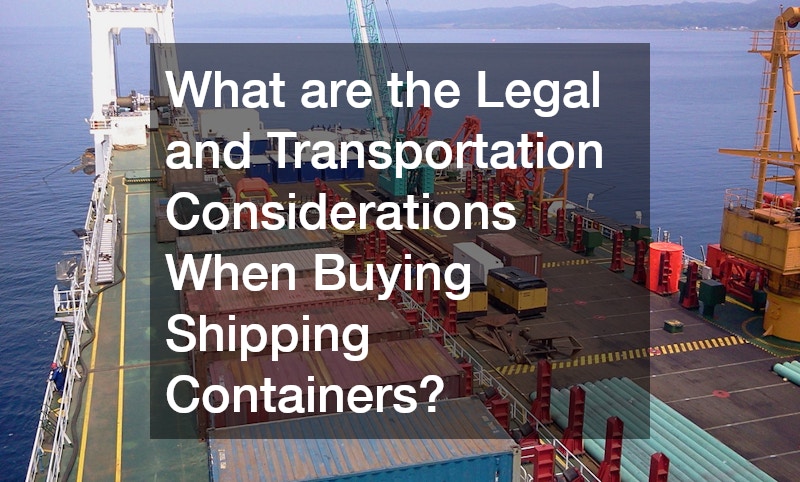
Explore the multiple facets of a shipping containers sale, from its uses to benefits, and the rising interest in reusing these versatile structures. Shipping containers have evolved beyond their original purpose, and sales for these units have garnered attention for both practical and innovative applications.
What Are the Common Uses for Shipping Containers Once Sold?
Residential and Commercial Applications
Shipping containers have found a foothold in residential and commercial applications, with many transforming into homes, offices, and retail spaces. Their structural integrity and modularity make them ideal candidates for innovative architectural solutions.
For instance, container homes are increasingly popular for their cost-effectiveness and ease of assembly. Similarly, businesses are utilizing them for sustainable pop-up shops and temporary workspaces, owing to their versatility. This trend reflects a shift in consumer preferences toward sustainable living and working environments. As an eco-friendly alternative to traditional construction, containers offer responsible choices for impactful living.
Industrial and Storage Purposes
Industries commonly use shipping containers for storage and operational facilities due to their durable design. Many businesses repurpose containers into workshops or storage units to maximize efficiency without the costs of traditional infrastructure. The industrial use of containers extends to temporary facility setups at construction sites and factories. This adaptation helps industries reduce costs while enjoying the flexibility of mobile and scalable space solutions. Furthermore, the availability of various sizes and grades allows companies to select containers precisely suited to their operational needs. This ensures that they can accommodate diverse requirements without compromising on safety and security.
How to Choose the Right Shipping Container for Purchase?
Assessing Size and Condition
Selecting the right container begins with evaluating the necessary size and condition that aligns with the intended application. Pre-purchase inspections are crucial for identifying possible damages or repairs that might affect usability. Potential buyers should consider factors like capacity needs and structural integrity when determining the most suitable option. Conducting thorough assessments ensures that the purchased container supports its anticipated function optimally. Moreover, size considerations include assessing space requirements for placement and future usage scenarios. All these factors play a pivotal role in ensuring a seamless transition from sale to practical utilization.
Understanding Container Grades and Specifications
Container grading systems and specifications are vital when selecting the appropriate unit. Buyers must familiarize themselves with grading standards to make informed decisions based on durability, appearance, and structural quality. Each grade offers unique advantages pertinent to specific needs, such as new ‘one-trip’ containers for superior quality or ‘cargo-worthy’ units for budget-conscious buyers. Understanding these distinctions aids in matching container features with usage requirements.
What Are the Benefits of Buying Used vs. New Shipping Containers?
Cost Savings and Environmental Impact
Opting for used shipping containers can result in significant cost savings compared to new ones. This makes purchasing used containers an appealing option for cost-conscious buyers seeking to maximize financial resources. From an environmental standpoint, reusing containers contributes positively by reducing waste and extending the lifespan of these robust structures. This practice exemplifies the principles of sustainability by minimizing the need for new resources.
Durability and Versatility Concerns
New shipping containers often offer the assurance of top-tier durability and customization opportunities. They are ideal for buyers seeking specific features or modifications that meet particular needs. Conversely, used containers boast a proven track record of enduring extreme conditions across travels, enhancing their reputation for ruggedness. Despite prior usage, they often retain substantial structural integrity, suitable for myriad applications.
Where Can I Buy Shipping Containers Locally and Online?
Local Suppliers and Dealerships
Many local suppliers and dealerships offer a range of shipping containers tailored to community demands and specific requirements. These locations often provide prospective buyers the opportunity to inspect containers firsthand, ensuring confidence in their purchase. In-person consultations with local vendors facilitate discussions on details such as conditions, legal regulations, and purchasing arrangements. This interaction enhances trust and assists buyers in navigating the complex process of acquiring suitable containers.
Online Marketplaces and Networks
Online platforms have become a popular avenue for purchasing shipping containers due to convenience and expansive offerings. They connect buyers with a wide range of sellers, providing access to diverse container types and price ranges. These marketplaces take advantage of detailed listings and user reviews to help buyers make informed decisions. The transparency and accessibility facilitated by online platforms streamline commercial transactions in the digital age. However, it is essential to verify seller credibility and the accuracy of listings to mitigate the risks associated with online purchases. Due diligence ensures a successful procurement experience and acquisition of the right container.
What are the Legal and Transportation Considerations When Buying Shipping Containers?
Legal Regulations and Compliance
Purchasing shipping containers involves adherence to legal regulations and compliance with safety standards. Buyers must be aware of zoning laws, building codes, and permits that might apply to container usage in specific locales. Ensuring compliance helps prevent legal issues that could arise from unauthorized installations or non-conforming uses. Legal awareness fosters responsible ownership and promotes public safety by aligning container practices with established guidelines.
Logistics and Transportation Planning
Securing transport for shipping containers necessitates careful planning to ensure safe and efficient delivery. Addressing challenges such as load capacity, access routes, and destination readiness is crucial to successful logistics operations. The logistics of moving these large structures require specialized equipment and expertise to prevent damage and ensure regulatory compliance. Proper transportation arrangements safeguard the investment and maintain the integrity of purchased containers.
.
